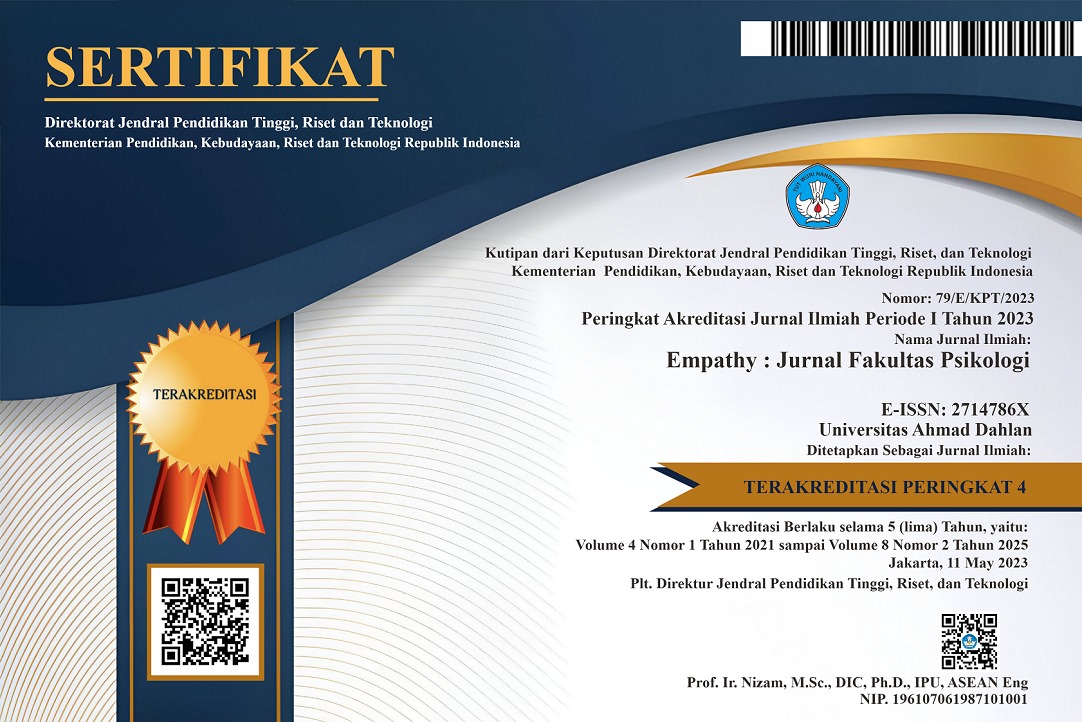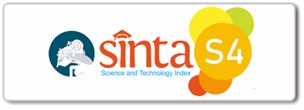The Overview of Final Student Self-Efficacy towards Lectures
Abstract
This article aims, first to describe the self-efficacy of final-semester students in lectures based on Albert Bandura's personality theory, second describe the factors that influence the self-efficacy of final students toward lectures based on Albert Bandura's personality theory. This study was qualitative and descriptive. The primary data sources in this study were students’ perceptions of their efficacy. Data collection was conducted through interviews with the final students as research subjects. Validation technique using triangulation. The results of the study, first final semester students have low self-efficacy and high self-confidence, second factors that influence student self-efficacy are lack of experience in mastering something, and social model modeling social persuasion.
Keywords
Full Text:
PDFReferences
Amirullah. (2015). Metode & Teknik Menyusun Proposal Penelitian. Malang: Media Nusa Creative.
Ansong, D., Eisensmith, S. R., Okum, M., & Chowa, G. A. (2019). The Importance of Self-Efficacy and Educational Aspirations For Academic Achievement in Resource-Limited Countries: Evidence From Ghana. Journal of Adolescence, 70(1), 13-23. doi.org/10.1016/j.adolescence.2018.11.003
Bandura. (2002). Guide for constructing self-efficacy scales. in Self efficacy beliefs of adolescents, Fajares and T. Urdan, Eds. Greenwich: Information Age Publishing
Bandura, A. (2002). Self-Efficacy: The Exercise of Control. 5th printing. New York: W.H. Freeman and Company.
Bungin, B. (2017). Penelitian Kualitatif: Komunikasi Ekonomi Kebijakan Publik dan Ilmu Sosial Lainnya. Jakarta: Prenada Media Group.
Feist, J., Feist, G. J., & Roberts, T.A. (2018). Teori Kepribadian. Jakarta: Salemba Humanika
Ghufron, M. N. & R. R. S. (2010). Teori-teori psikologi. Yogyakarta: Ar-Ruzz Media
Liu, H., & Pan, X. (2011). The influence of leaders’ hope and self-efficacy on their subjective well-being [In Chinese]. Psychological Exploration, 31, 176–181.
Nan, W. (2018). Empirical Study on the Impact of Creative Self-Efficacy of College Student Entrepreneurs on Innovative Behavior. Science Journal of Business and Management, 6(5), 93-99. doi: 10.11648/j.sjbm.20180605.11
Olivier, E., Archambault, I., Clercq, M. D., & Galand, B. (2018). Student Self-Efficacy, Classroom Engagement, and Academic Achievement: Comparing Three Theoretical Frameworks. Journal of Youth and Adolescence, 1-15. doi.org/10.1007/s10964-018-0952-0
Pachu, N., Strachan, S., McMillan, D., Ripat, J., & Webber, S. (2020). University Students’ Knowledge, Self-Efficacy, Outcome Expectations, and Barriers Related to Reducing Sedentary Behavior: A Qualitative Study. Journal of American College Health, 1-9. DOI:10.1080/07448481.2020.1786098
Rafiola, R. H., Setyosari, P., Radjah, C. L., & Ramli, M. (2020). The Effect of Learning Motivation, Self-Efficacy, and Blended Learning on Students’ Achievement in The Industrial Revolution 4.0. iJET, 15(8), 71-82. doi.org/10.3991/ijet.v15i08.12525
Schunk, D. H., & Mullen, C. A. (2012). Self-efficacy as an engaged learner. In S. L. Christenson, A. L. Reschly, C. Wylie, (eds.) Handbook of research on student engagement. (pp. 219–236). New York, NY: Springer.
Schunk, D. H., & Pajares, F. (2009). Self-efficacy theory. In K. R. Wentzel & A. Wigfield (Eds.), Handbook of motivation at school (pp. 35–54). New York, NY: Routledge.
Sebastian, B. B., Slaten, C. D., Williams, M. S., & Elison, Z. M. (2021). College Student Exercise Motivation: The Role of Belongingness and College Self-Efficacy. International Journal of Contemporary Education, 4(2), 1-11. doi:10.11114/ijce.v4i2.5221
Shen, Z.-F., Yang, X.-M., Sun, X.-Q., He, Q.-G., & Han, B.-X. (2013). Influence of personality and general self-efficacy on medical college students’ subjective well-being [In Chinese]. Chinese Journal of Clinical Psychology, 21, 303–305. doi.org/b8k3
Usman, H., & Akbar, S. (2006). Metodologi Penelitian Sosial. Jakarta: PT. Bumi Aksara.
Yu, Y., & Luo, J. (2018). Dispositional optimism and well-being in college students: self-efficacy as a mediator. Social behavior and personality, 46(5), 783-792. doi.org/10.2224/sbp.6746.
Zimmerman, B. J. (2000). Self-efficacy: an essential motive to learn. Contemporary Educational Psychology, 25(1), 82–91. https://doi.org/10.1006/ceps.1999.1016
DOI: http://dx.doi.org/10.12928/empathy.v5i2.24454
Refbacks
- There are currently no refbacks.
Copyright (c) 2022 Indah Rahmi Inayati

This work is licensed under a Creative Commons Attribution-ShareAlike 4.0 International License.
================================================================================================
ISSN 2303-114X (print) || 2714-786X (online)
Organized by the Faculty of Psychology
Published by Universitas Ahmad Dahlan, Yogyakarta
Website: http://journal.uad.ac.id/index.php/EMPATHY
email: empathy.jfp@psy.uad.ac.id
Lisensi Creative Commons Atribusi-BerbagiSerupa 4.0 Internasional




